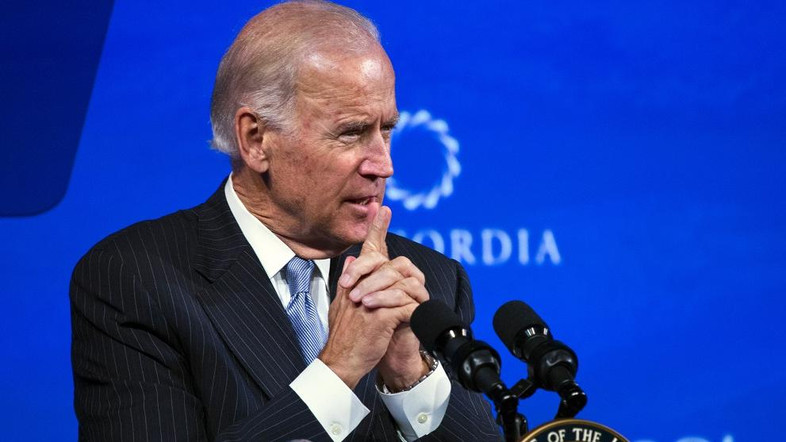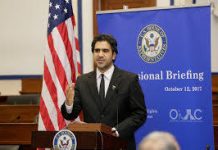خالد أبو طعمة/معهد كايتستون: تحذير نهائي من العرب لبايدن
A Final Warning from Arabs to Biden
Khaled Abu Toameh/Gatestone Institute/March 16/2022
In a message directed at the Biden administration and the other Western powers involved in the Vienna negotiations, the Arab countries said that Iran and its terrorist militias are continuing to create chaos and instability, especially in Syria, Iraq, Yemen and Lebanon.
The Arabs, including the Arab League, are telling the Biden administration that, in their view, it is not only Iran that threatens their security, but also its terrorist proxies, including Hamas, Palestinian Islamic Jihad, Hezbollah, and the Houthis.
The Arabs are clearly worried about the financial and military aid that Iran is providing to the terrorist groups.
Any deal with Iran will further strengthen these groups and encourage them to step up their terrorist attacks.
The Arabs are also worried that when Iran obtains nuclear weapons, they will sooner or later find their way into the hands of its terrorist proxies and other terrorist groups, including Islamic State (ISIS) and Al-Qaeda.
“This president [Biden] is deaf. He cannot be trusted.” – Ali Al-Sarraf, Iraqi political analyst, Al-Arab, March 12, 2022.
If the Biden administration and its friends reach a new deal with Iran’s mullahs, we are likely to see more Arabs come out against the US.
“We have made it very clear that if Iran acquires a nuclear capability we will do everything we can to do the same.” — Adel al-Jubeir, then Saudi Minister of Foreign Affairs, to CNN, May 9, 2018.
The Arabs consider Iran a lethal threat to their national security and the stability of the entire Middle East and other parts of the world. If the Biden administration is going to align itself with the mullahs, it will lose the support of its Arab and Muslim allies, who feel bitterly betrayed and fear that nuclear weapons will end up in the hands of these very mullahs and their terrorist groups.
Arab states are worried that when Iran obtains nuclear weapons, they will sooner or later find their way into the hands of its terrorist proxies and other terrorist groups, including Islamic State (ISIS) and Al-Qaeda. “We have made it very clear that if Iran acquires a nuclear capability we will do everything we can to do the same,” said Saudi Arabia’s then Foreign Minister Adel al-Jubeir in 2018. Pictured: Al-Jubeir speaks to the media at the Saudi Embassy in London on June 20, 2019. (Photo by Tolga Akmen/AFP via Getty Images)
In what appears to be an eleventh hour and desperate warning to the Biden administration against striking a deal with the Iranian regime, four Arab countries have expressed deep concern over Iran’s ballistic missile program and ongoing support for terrorism.
In a statement issued in Cairo on March 9, the Arab Quartet Committee — Saudi Arabia, the United Arab Emirates (UAE), Bahrain and Egypt — said that Iran continues to interfere in the internal affairs of Arab countries and play a role in sowing sectarian discord among them by supporting and arming terrorist groups such as the Houthi and Hezbollah militias.
The statement was issued amid growing concern in some Arab countries, that the US and other Western powers could reach a deal with Iran to revive the 2015 Joint Comprehensive Plan of Action, also known as the Iran nuclear deal.
Iran poses a threat to the security of Arab states and impedes regional and international efforts to resolve issues and crises in the region through peaceful means, the committee said.
While the Arab countries above — which have long been considered close allies of the US — stressed the importance of supporting efforts to prevent Iran from acquiring nuclear weapons at the Vienna negotiations, they said any deal reached with Tehran should be seen as a temporary, and not final, agreement.
Reflecting the Arabs’ distrust of Iran, the Arab countries emphasized the need for strengthening the International Atomic Energy Agency’s monitoring role over the Iranians’ nuclear program.
In a message directed at the Biden administration and the other Western powers involved in the Vienna negotiations, the Arab countries said that Iran and its terrorist militias are continuing to create chaos and instability, especially in Syria, Iraq, Yemen and Lebanon.
The Arabs, including the Arab League, are telling the Biden administration that, in their view, it is not only Iran that threatens their security, but also its terrorist proxies, including Hamas, Palestinian Islamic Jihad, Hezbollah, and the Houthis.
The Arabs are clearly worried about the financial and military aid that Iran is providing to the terrorist groups.
Any deal with Iran will further strengthen these groups and encourage them to step up their terrorist attacks.
The Arabs are also worried that when Iran obtains nuclear weapons, they will sooner or later find their way into the hands of its terrorist proxies and other terrorist groups, including Islamic State (ISIS) and Al-Qaeda.
The Arab countries condemned Iran’s continued support for terrorist and sabotage acts in the Arab countries, and Iran’s continued development of its ballistic missile program and other types of missiles, as well as supplying the Houthi terrorist militia in Yemen with these weapons.
They also condemned the continued launching of Iranian-made ballistic missiles and drones from Yemen against vital and civilian targets in Saudi Arabia and the UAE. The attacks, the Arab countries said, “constitute a serious threat to security and stability in the region and a flagrant violation of Security Council Resolution No. 2216 (2015).”
The Arab countries accused Iran of supporting, training and arming terrorist groups in Bahrain and condemned Hezbollah’s repeated threats and assaults against Saudi Arabia, UAE, Bahrain and Yemen.
They condemned Iran’s interference in the Syrian civil war and affirmed their solidarity with Morocco in confronting the interference of the Iranian regime and Hezbollah in the kingdom’s internal affairs, especially in regard to arming and training the separatist elements that threaten territorial integrity, security and stability.
In 2018, Morocco severed diplomatic ties with Iran after accusing Hezbollah of training Polisario Front separatist fighters in Western Sahara.
This concern over Iran’s dangerous schemes and actions is shared by a growing number of Arab political analysts, commentators and journalists. Each time the Arabs hear that the Biden administration and its Western allies are negotiating with Iran’s mullahs about a possible return to the nuclear deal, they panic and send a volley of warnings against the policy of appeasement towards Iran.
For now, it seems that Washington’s major Arab allies — Saudi Arabia and the UAE — are so frustrated with the Biden administration that their leaders do not even want to hear from US President Joe Biden.
“The Biden administration is very foolish,” wrote Iraqi political analyst Ali Al-Sarraf.
“Instead of taking advantage of the capabilities of two major allies such as Saudi Arabia and the UAE and listening to their concerns, it chose to bet on Iran’s return to the oil market. Then, it chose to win over another adversary, Venezuela, to persuade it to export its oil to the US in exchange for lifting the sanctions.”
Al-Sarraf said that when Saudi Crown Prince Mohammed bin Salman and UAE Crown Prince Sheikh Mohammed bin Zayed rejected Biden’s attempts to contact them, “it is not because they want to abandon the alliance with the US, but because they do not see a president in the White House. This president is deaf. He cannot be trusted. Going to Iran and Venezuela does not come without a without a price. They are not a real compensation for the role that the Gulf states can play in the battle for the stability of the international system.”
The Iraqi analyst said that Saudi Arabia and the UAE have repeatedly tried to draw the White House’s attention to the fact that relations are fracturing due to US “reluctance” to respond to the threats of Iran and the acts of terrorism practiced by the Houthis against Saudi Arabia and the UAE.
Hussein Al-Sufi, a Yemeni researcher and head of the Al-Bilad Center for Studies and Media, is another prominent Arab who has added his voice to those who are warning the world about the dangers of appeasing the mullahs in Tehran or placing any confidence in them.
“Iran practices state terrorism and commits crimes in various parts of the world,” Al-Sufi cautioned.
“Iran has established terrorist militias in Iraq, Syria, Lebanon and Yemen, and finances and arms these gangs. Iran has adopted a ‘scorched earth’ strategy to create chaos in the Arab countries and destroy their societies.”
Noting that the mullahs’ regime in Tehran defies all international laws and norms and acts brutally, the Yemeni researcher pointed out that the US and the West have failed to hold Iran accountable for its unabated terrorism.
In the absence of a US and Western stance to stand up to Iran, he said, the Arab countries need to increase cooperation and diplomatic activity to hold Iran’s mullahs accountable for their crimes.
Sayed Zahra, deputy editor of the Bahraini newspaper Akhbar Al-Khaleej, said that in order to understand the crisis between the Biden administration and Saudi Arabia and the UAE, one needs to ask how it started, what are the reasons behind it and who is responsible.
“The crisis began during the administration of former US President Barack Obama,” Zahra wrote.
“Obama turned against the alliance with the Arab Gulf states, signed the nuclear agreement with Iran, and launched a new era of Iranian terrorism in the region without taking into account everything related to the interests, security and stability of our countries.”
Zahra said that this was accompanied by a “political speech that Obama publicly adopted and which included hostility and hatred for the Arab Gulf states and peoples.”
During the Obama era, he said, the Gulf-American and Arab-American relations in general witnessed a severe crisis and a deep rift.
“In 2011, the US administration conspired to overthrow Arab regimes and undermine the security and stability of other countries. The Obama administration showed that it did not care about the longtime alliance and ties with the Gulf states. When Biden took office, he repeated the same hostile rhetoric towards the Gulf states, especially Saudi Arabia. The catastrophe is that Biden’s positions have been translated into practical policies and steps taken by his administration that target the Gulf states. The Biden administration, in one of the biggest hostile moves, removed the Houthis from the terrorist list. Biden gave a free hand to the Houthis, who understood his decision as an American green light to escalate their terrorist operations from Yemen against Saudi Arabia and the United Arab Emirates. Then there is the great disaster, which is Biden’s rush to reach an agreement with Iran in at any price, deliberately marginalizing the Gulf states and ignoring their concerns and demands. A new agreement with Iran will lead to a major wave of Iranian terrorism against Arab countries…
“The important thing is that in the end, these positions and developments have created a state of mistrust on the part of the Arab states in America and established a general conviction that it is no longer possible to rely on the US. It has become very difficult to ask the Arab states to continue dealing with America as a trusted strategic ally.”
In yet another sign that the Arabs are growing increasingly frustrated with the Biden administration for its perceived appeasement of Iran and its terrorist proxies, the Arab interior ministers have endorsed a resolution for classifying the Iranian-backed Houthi militia as a terrorist organization. Again, the resolution is directed towards the Biden administration, which last year delisted the Houthis from the list of terrorist organizations.
Many Arabs were hoping that the Biden administration would reinstate the Houthi militia as a terrorist organization, especially in wake of the recent drone and missile attacks on Saudi Arabia and the UAE.
The resolution adopted by the Arab interior ministers sends a message to the Biden administration to the effect that the Arabs are not going to wait for Washington to put the Houthi militia back on the list of terrorism.
The Arab ministers are telling the US that if it cannot see a terrorist group for what it is, the Arabs are capable of doing so.
The message that many Arabs are sending to Washington is that the appeasement of the mullahs and failure to stand with friends in the Arab world is emboldening the Houthis and other Islamic terrorist groups that are threatening not only Arabs and Muslims, but the US and other Western countries as well.
If the Biden administration and its friends reach a new deal with Iran’s mullahs, we are likely to see more Arabs come out against the US.
Saudi Arabia’s then Minister of Foreign Affairs, Adel al-Jubeir, already warned years ago, “We have made it very clear that if Iran acquires a nuclear capability we will do everything we can to do the same.”
The Arabs consider Iran a lethal threat to their national security and the stability of the entire Middle East and other parts of the world. If the Biden administration is going to align itself with the mullahs, it will lose the support of its Arab and Muslim allies, who feel bitterly betrayed and fear that nuclear weapons will end up in the hands of these very mullahs and their terrorist groups.
*Khaled Abu Toameh is an award-winning journalist based in Jerusalem.
© 2022 Gatestone Institute. All rights reserved. The articles printed here do not necessarily reflect the views of the Editors or of Gatestone Institute. No part of the Gatestone website or any of its contents may be reproduced, copied or modified, without the prior written consent of Gatestone Institute.
https://www.gatestoneinstitute.org/18332/arabs-warning-biden




















